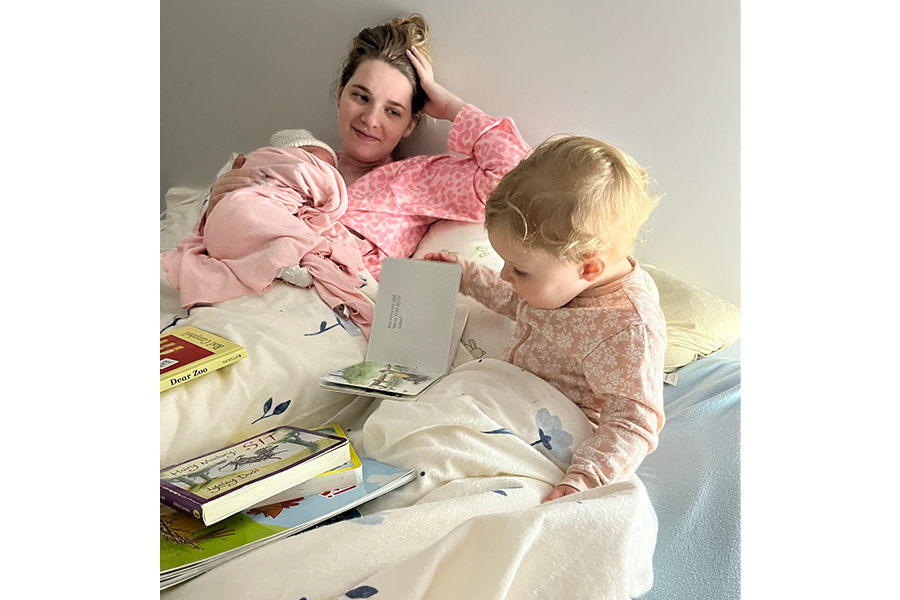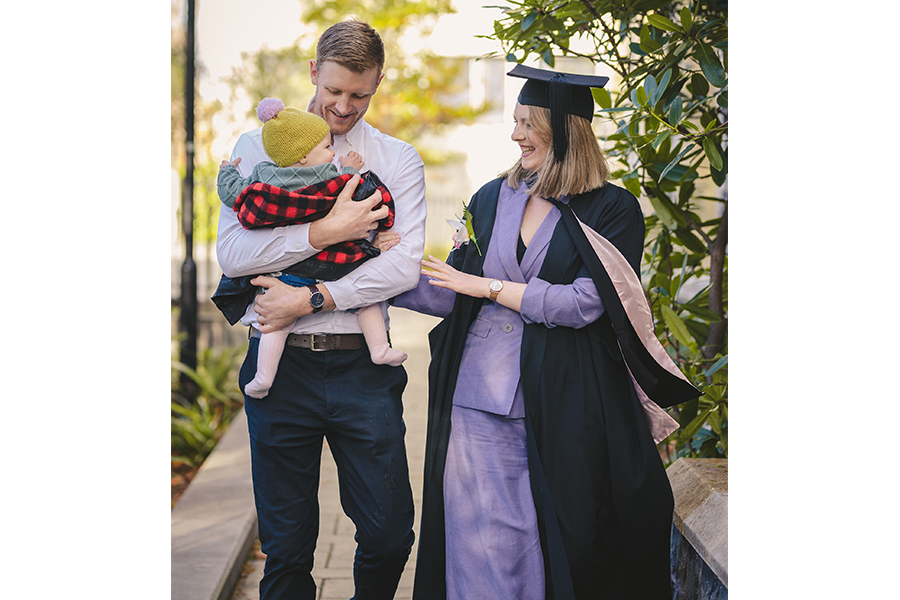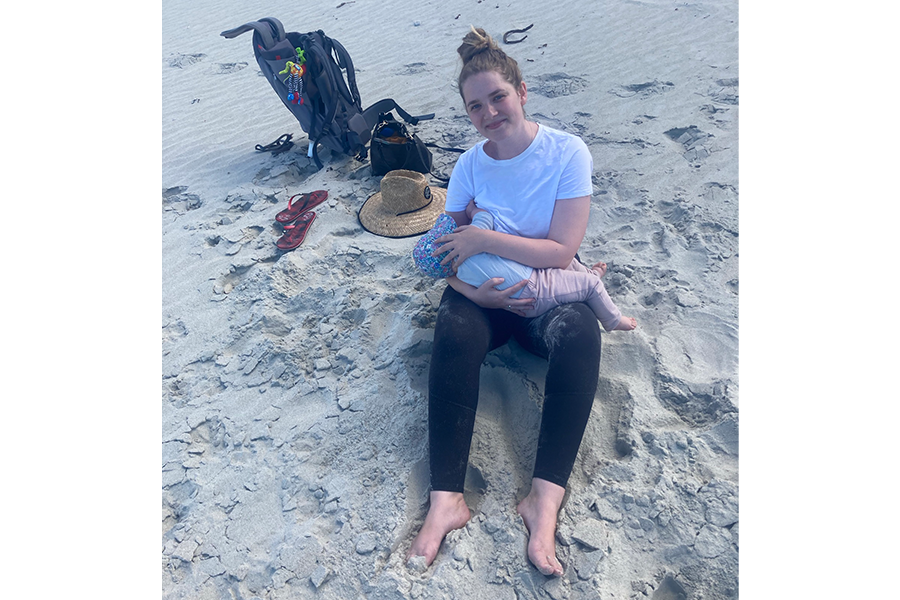
PhD candidate and mother of two Charlotte Bruce Kells wants to highlight the difficulties new parents face and help generate more support for young families.
Welcome to the sixth instalment in our series ‘Introducing postgraduate SGSC’, which focuses on postgraduate students within the Sociology, Gender Studies and Criminology Department. In this edition we chat with Charlotte Bruce Kells about her research into the social construct of motherhood. There are links at the end of this story to the first instalments of the series.
Over time society has shifted from communities raising children together to a more individual, nuclear family model.
Only one parent in Aotearoa New Zealand can take parental leave, which is often mothers, meaning mothers can be quite isolated while caring for children.
PhD candidate Charlotte Bruce Kells, who gave birth to her first child part way through 2020, says some families have grandparents, aunties and uncles, and friends who help out, but many don’t.
“There are lots of families out there like me that really don’t have anything or anyone. It’s just two parents trying to get through paid work, study, or whatever else life has, on top of raising a little baby.”
It’s a difficult process, and possibly one that’s hard for people to understand if they haven’t been through it themselves.
Bruce Kells started writing her thesis, Analysing the ‘Mother’ Identity Through Pregnancy, Childbirth and the Postpartum Period, through the Sociology, Gender Studies and Criminology Department in 2021.
Seeing people around her have their first babies, and having similar difficult experiences makes the research even more important for Bruce Kells.
“People aren’t talking about it, or if they are, it’s not going further than these private conversations.
“Parents need to start pushing for more support. That’s my whole motivation behind it all.”
Bruce Kells is interviewing a number of women, initially at a late stage in their pregnancy, once not long after the birth of their child, and for a third and final time at 12 weeks postpartum. She is tracking their individual experiences, and mapping out how they feel, and when, and identifying where they need more support.
The noticeable lack of mental health support for Kiwi parents is concerning, Bruce Kells says.
Parents get six weeks’ support from their midwife once their baby is born. After that, unless families use Plunket or a service offered from their GP, there’s not much else available.
“A lot of families find support really suddenly falls away once they lose contact with their midwife.
“They don’t know where to go for those basic everyday things of learning how to look after a baby.”
The Southern District Health Board does not have a designated maternal mental health support service, any immediate support available is through midwives or private organisations. The hospital does have a waitlist for parents wanting support.

Bruce Kells gave birth to her first child in 2020 in the midst of the pandemic.
One mum Bruce Kells interviewed wasn’t coping very well and faced a 10-week-long wait before she could access a maternal mental health service “which is just shocking”.
“There’s nowhere parents can go.”
In addition to that, Aotearoa New Zealand is “really poorly ranked” on OECD measures for child affordability. Paid parental leave is capped at around $650 a week before tax, student loan repayments and Kiwisaver payments.
“I was getting almost the full amount, which around $550 a week after all those things. For a lot of people that’s a huge, huge cut to income.”
Paid parental leave stops after just six months, while fathers and partners are given just two weeks unpaid parental leave.
The OECD average for paid parental leave is 52 weeks full time pay, putting Aotearoa New Zealand well behind, and putting Kiwi parents under financial strain.
Day care costs contribute to this strain. Parents receive 20 free hours a week of early childhood education once their child turns three. Prior to Bruce Kells’ eldest turning three, it was costing $450 per week for both her children to be in ECE.
Bruce Kells says biological motherhood refers to the physical parts of the role such as reproduction, being pregnant, giving birth and breast feeding; “all of those kind of things”.
Everything else about motherhood is social construct, she says, such as the idea that mothers that should be home full-time with babies as opposed to fathers.
This construct has resulted in some “dominant narratives” around what makes a good mother and what makes a bad mother, Bruce Kells says.
A lot of these narratives contradict each other.
“A really big one is whether you go to paid work or whether you stay home full time with your children. And they’re both different types of ideal motherhood.
“Nobody can every really win.”
Mothers find themselves aspiring to be this “ideal mother” that is “actually impossible” to achieve.
Many of the mums Bruce Kells is interviewing talk about how motherhood is portrayed on social media – influencer mums and blog mums present their ‘sugar coated’ experiences where “everything’s great” all the time, which is unrealistic.
There are many online “experts” offering advice on how children should be raised, what they should and shouldn’t be fed, whether they should be sleep trained and what you should or shouldn’t buy children toy-wise.
“It’s pretty much just like every aspect of parenting and raising your children is kind of scripted by social media and experts.”

Many of the mums Bruce Kells has interviewed say social media often presents an unrealistic experience of motherhood.
At what point a woman feels like a mother differs between women, as well.
“Some of the mums I talked to talk about how from the moment they saw two pink lines on pregnancy test they felt like a mum. Then you get the other end of the scale where they don’t feel like mums until their babies are sometimes even a few months old.”
Despite how these women may feel about their status as a mother, there are many things about their life which change immediately as a result of those two pink lines.
“You can’t drink [alcohol], you might feel really sick, you need to go to medical appointments, and all of the kind of restrictions and changes that happen that you either need to enforce on yourself or happen involuntarily to your body.”
Then, there’s the moment when a women holds the baby in their arms for the first time.
“For some mums, they have an instant ‘I’m a mum now, this is my baby’. And for other mums it takes a few weeks, months, days, however long, to really feel that.”
Bruce Kells fell pregnant with her first child during her masters; “she was a surprise, I wasn’t planning on having a baby”.
Bruce Kells’ master’s research looked at media representations of former Prime Minister Jacinda Ardern as a working mother and what kind of impact that was having on working mums of New Zealand. She was inspired to carry out this research after he own experiences of becoming a mum.
“How transformative becoming a mum was, and how much it changed my life and my sense of self.”
-Kōrero by internal communications adviser, Koren Allpress